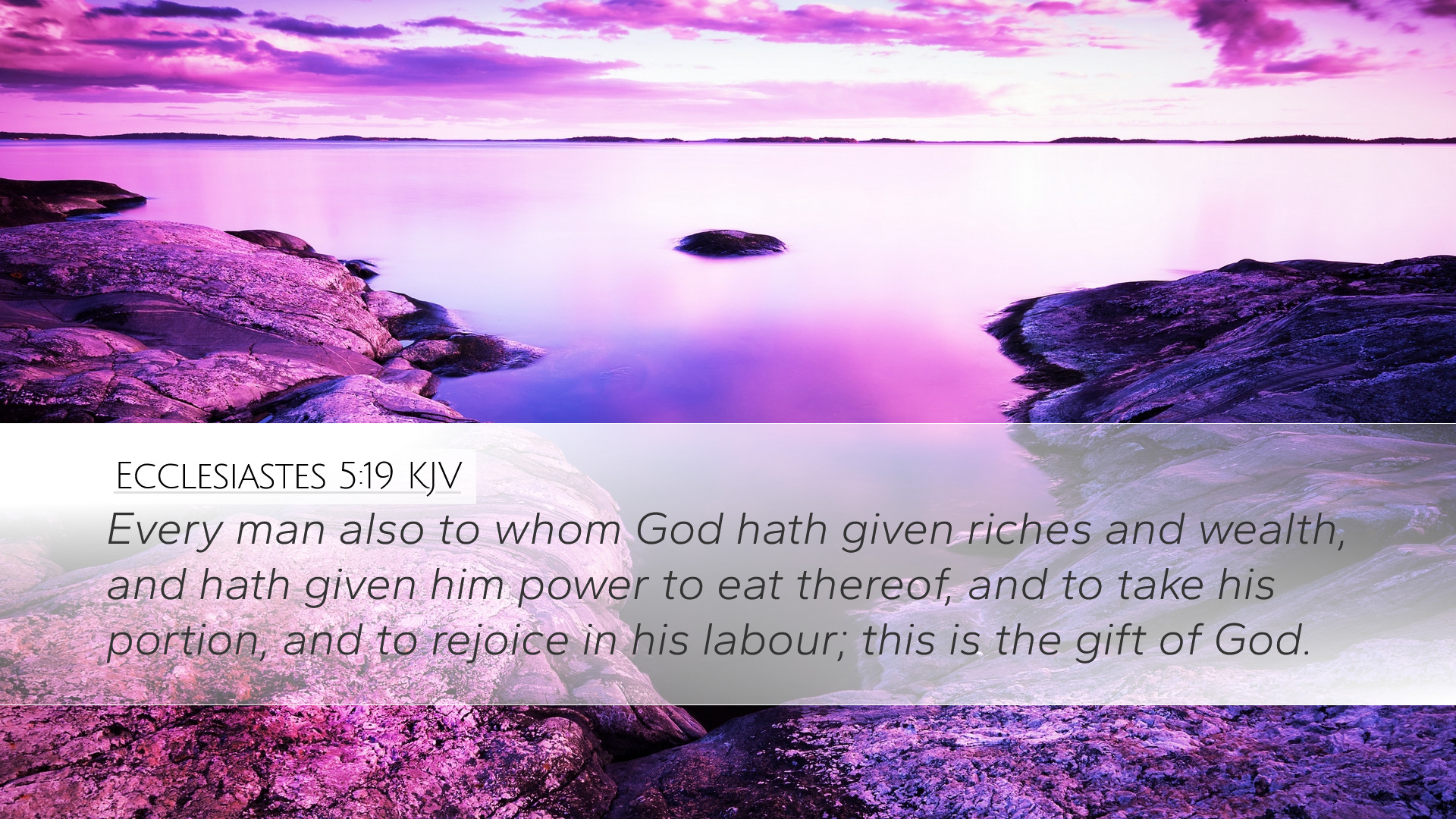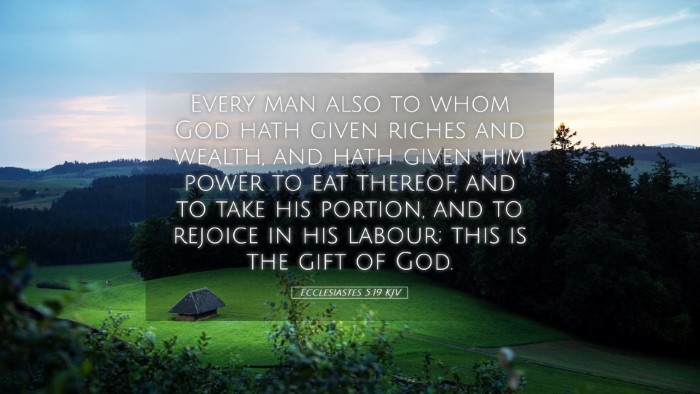Commentary on Ecclesiastes 5:19
Ecclesiastes 5:19 states: "As for every man to whom God has given riches and wealth, and
given him power to eat of it, to receive his heritage and rejoice in his labor—this is the
gift of God."
This verse encapsulates a profound insight into the nature of wealth and the divine
provision that accompanies it. In the following commentary, we shall explore various
facets of this scripture based on insights from renowned public domain commentaries.
Understanding God’s Gifts
The verse asserts that wealth and the ability to enjoy it are gifts from God. Matthew Henry
emphasizes that it is divine grace that bestows riches and the capacity to enjoy them.
He points out that not everyone bestowed with wealth has the ability or means to enjoy it.
Thus, the enjoyment of wealth is a significant aspect that should not be overlooked.
Albert Barnes comments on the term "power to eat of it." He indicates that
this denotes an understanding and spiritual capacity to enjoy one’s possessions. He notes
that God not only provides wealth but also the heart's inclination to enjoy that wealth.
This highlights the relationship between material possessions and spiritual enjoyment.
The Role of Labor
The phrase "to receive his heritage and rejoice in his labor" illustrates the importance of
labor and its association with joy. Adam Clarke elucidates that labor does not only yield
material benefits but also intrinsic value. The ability to work and enjoy the fruits of one’s
labor is, in itself, a rich gift.
The notion of rejoicing in one's labor elevates the mundane aspects of work. It suggests that
work, when viewed through the lens of gratitude and divine providence, can lead to fulfillment.
This joy stems not merely from the end product but from the process made possible through God’s
provision.
Riches, Wealth, and Contentment
Ecclesiastes often reflects on the transitory nature of wealth. Here, it invites contemplation
on the right attitude toward riches. Matthew Henry warns against the idolization of wealth,
advising that true contentment comes not from material abundance but from a heart aligned
with God’s purposes.
Albert Barnes supports this by clarifying that while riches are a gift from God,
they become a snare if the individual is not rooted in the right perspective. The joy of wealth,
when processed through gratitude to God, keeps a person humble and prevents a materialistic
mindset.
The Divine Perspective on Enjoyment
The verse also indicates that the capacity to enjoy wealth is ultimately a gift from God.
Henry asserts that without divine blessing, wealth can lead to sorrow. Therefore, true enjoyment
stems from a relationship with God where wealth is seen as a means to serve and glorify Him.
Adam Clarke highlights the cyclical nature of wealth: it is not just about
accumulating resources but about realizing the joy and purpose behind their use. Enjoying wealth
means recognizing it as part of God's overarching plan for fulfilling one's life and the lives of
others.
The Biblical Ethos of Wealth
This verse integrates the wider biblical teaching on wealth. The application of wealth
transcends personal enjoyment; it encompasses stewardship and moral responsibility. As
suggested by both Henry and Clarke, riches are meant to be shared and used for the good of
others, reflecting God's generosity.
Albert Barnes notes that as stewards, believers must strive to align their
pursuits and spending with divine priorities. When wealth is enjoyed righteously, it fosters
a spirit of gratitude and generosity—a witness to God’s provision. This reinforces the idea
that God gives wealth not to elevate individuals but to promote harmony in community.
Conclusion
Ecclesiastes 5:19 serves as a poignant reminder of the relationship between wealth, enjoyment,
labor, and divine blessing. For pastors, students, and theologians, this verse encourages a
holistic perspective on stewardship. True wealth is a complex interplay of gratitude, purpose,
and enjoyment in light of God's grace.
In a world frequently preoccupied with materialism, this scripture calls believers to
reassess their understanding of riches, guiding them toward a more enriching and fulfilling
relationship with God and others. The divine gifts of wealth and the capacity to enjoy it
must be recognized as part of God’s providential care, further advancing the mission of love
and generosity in the Christian life.


